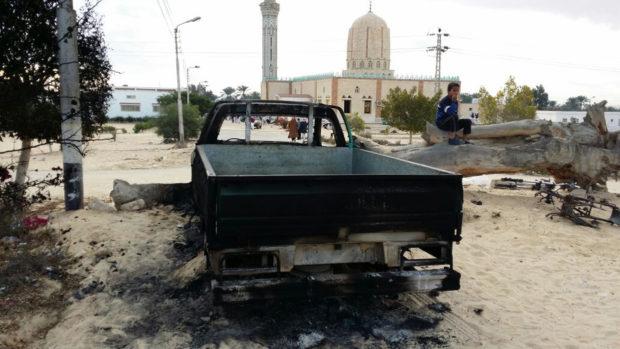
A burned truck is seen outside Al-Rawda Mosque in Bir al-Abd northern Sinai, Egypt a day after attackers killed hundreds of worshippers, on Saturday, Nov. 25, 2017. Friday’s assault was Egypt’s deadliest attack by Islamic extremists in the country’s modern history, a grim milestone in a long-running fight against an insurgency led by a local affiliate of the Islamic State group.(AP Photo/Tarek Samy)
CAIRO — Survivors and Egypt’s top prosecutor on Saturday gave detailed accounts of Friday’s massacre at a mosque in northern Sinai.
They described intense gunfire ringing out as the mosque was shaken by blasts, and children screaming as their parents were mowed down. A stampede occurred as people rushed for an exit, while others tried desperately to force their way out of windows.
They said the attackers arrived in five SUVs, took positions across from the mosque’s door and windows. Just as the imam was about to deliver his Friday sermon from atop the pulpit, they opened fire and tossed grenades at the estimated 500 worshippers inside.
When the violence finally stopped, more than 300 people were dead, including 27 children, and 128 injured.
It was Egypt’s deadliest attack by Islamic extremists in the country’s modern history, a grim milestone in a long-running fight against an insurgency led by a local affiliate of the Islamic State group.
Meanwhile, the main gateway for Palestinians out of the Gaza Strip was closed following the attack.
The Rafah crossing was expected to open temporarily on Saturday. But following the attack, travelers were told they would not be able to cross after all.
On Saturday, guards were the only people to be seen at the crossing. Ruling party Hamas says 30,000 people have been waiting for a chance to travel. Thus far, Rafah has opened for people exiting Gaza only 17 days this year.
Egypt has kept Rafah largely sealed off since 2013, after the ouster of Egypt’s elected Islamist President Mohammed Morsi while authorities have been fighting an Islamist insurgency.
Hamas, which has wielded power in Gaza since it ousted forces loyal to the Western-backed Fatah faction in 2007, condemned the Sinai attack.
Egypt’s chief prosecutor said in a statement that the attack on a Sinai mosque has killed 305 people, including 27 children.
In a statement Saturday, Nabil Sadeq said the attack a day earlier also left 128 people wounded.
Sadeq said it was carried out by 25-30 militants who arrived at the mosque in the small town of Bir al-Abd in five all-terrain vehicles. He said the militants stationed themselves at the mosque’s main door and 12 windows before opening fire on worshippers inside. They also torched seven cars belonging to the worshippers that were parked outside.
There was no claim of responsibility for the attack, the deadliest by Islamic extremists in Egypt’s modern history. The mosque is frequented by Sufi Muslims, a mystic school of Islam that militants consider heretic.